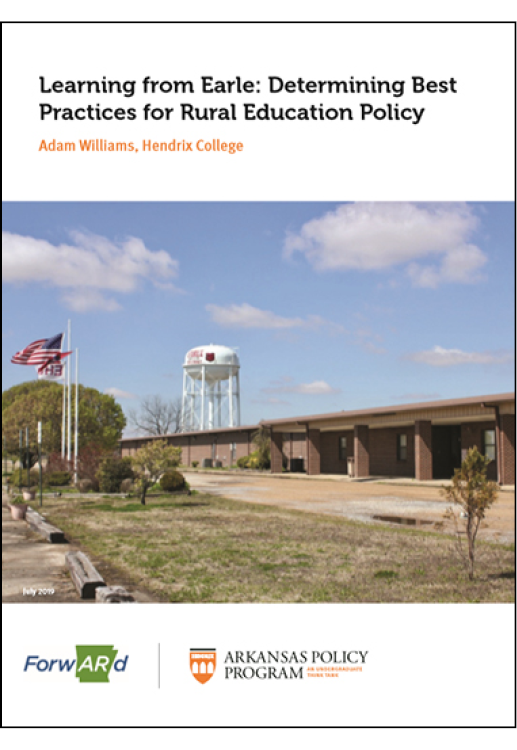CONWAY, Ark. (August 20*, 2019)
– Treating struggling public schools with a “one-size-fits-all” approach tends
to help rural schools least of all, according to a new report from the Arkansas
Policy Program (APP).
Adam Williams ’19, an
international relations major and psychology minor who graduated from Hendrix magna cum laude, spent much of his
senior year researching the Earle School District in the Arkansas Delta and
developing a case study that leads readers to consider the multiple challenges
rural schools face on the path to positive transformation. The result is this
APP report, Learning from Earle:
Determining Best Practices for Rural Education Policy. Issued by the
Arkansas Policy Project at Hendrix College in collaboration with ForwARd
Arkansas and with support from the Rural Community Alliance, Learning from Earle highlights the need
to consider the distinctive attributes of schools in need of improvement.
The most common school turnaround
strategies work best for schools in urban settings—particularly problematic in
Arkansas, which has a higher proportion of its students in rural schools than
all but a handful of other states. Already under-resourced schools seldom
benefit from firing staff, closing down entirely, or pursuing charter-based
strategies because these options fail to address the inherent challenges of a
declining rural population.
After outlining why other
approaches are unlikely to work in a place like Earle, Williams concludes that
the tactic with the greatest promise for success in rural districts like it is
the “community school” model. This strategy focuses on bringing down the walls
between schools and the surrounding community to enhance services offered by
community-based organizations to support education in the district.
“Just as the schools are
strengthened by the services—from health care to afterschool care to computer
access—offered by community organizations, there is a mutual benefit as school
improvement offers enhanced quality of life in the community,” said Dr. Jay
Barth, who advised Williams in his research.
“The success of th is model
in Earle and any rural area requires an ongoing commitment from the community
and its school,” Williams said. “Both must buy into reform to fully overcome
the limited resources these areas face and create a thriving community school.”
is model
in Earle and any rural area requires an ongoing commitment from the community
and its school,” Williams said. “Both must buy into reform to fully overcome
the limited resources these areas face and create a thriving community school.”
“Every student deserves
access to the best possible education to prepare them for success in the work
force and beyond, no matter where they live or what school they attend,” said
Susan Harriman, executive director of ForwARd Arkansas. “This desire for
educational equity guides the work of ForwARd, and we were proud to collaborate
on this important report that highlights ways to best serve students across
Arkansas.”
About
Hendrix College
A private liberal arts
college in Conway, Arkansas, Hendrix College consistently earns recognition as
one of the country’s leading liberal arts institutions, and is featured in Colleges That Change Lives: 40 Schools That
Will Change the Way You Think About Colleges. Its academic quality and
rigor, innovation, and value have established Hendrix as a fixture in numerous
college guides, lists, and rankings. Founded in 1876, Hendrix has been
affiliated with the United Methodist Church since 1884. To learn more, visit www.hendrix.edu.
* This release, originally posted Aug. 13, 2019, was amended Aug. 20 with a quote from Susan Harriman.